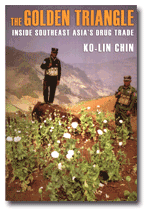Around the Triangle
Since the early 2000s, Chinese businessmen and the Wa army have been the main players in the Golden Triangle drug trade
MOST articles and publications about the United Wa State Army (UWSA) and its role in the drug trade are based on second-hand information and are often sensationalist. This new book by Ko-lin Chin is a rare and and a much needed exception. It is based on more than 400 field interviews, most of which were conducted in the Wa region by the author, with the help of local assistants.
 |
| The Golden Triangle, Inside Southeast Asia’s Drug Trade, by Ko-lin Chin. Cornell University Press, 2009. P 296. |
It is a pity this book was not published earlier; the bulk of the research was done during February-May 2001. The author did carry out some follow-up research in Burma in 2002, 2004 and 2006 in Rangoon, Mandalay and Muse. Regrettably, the study does not capture the changes that have taken place in the drugs market in the Wa region since the UWSA banned opium cultivation in June 2005.
In the first chapters, Ko-lin Chin provides some background information about the Golden Triangle and the armed conflicts in Burma, mainly based on secondary sources. This is followed by a chapter on the Wa region and its inhabitants, with a brief historical section and more detailed information about the northern (along the Chinese border) and southern (along the Thai border) Wa regions.
The most compelling chapters in the book concern the opium trade, heroin production and trafficking, the methamphetamine business, drug use, drug control, and the business and politics of drugs. These sections, which make up the bulk of the book, are all based on original research. They contain many interesting and illuminating quotes, and provide the reader with a unique insight.
According to Ko-lin Chin, opium farmers make only a few hundred dollars a year from cultivating opium, which they use to buy food, (especially rice, chillies and salt), clothes and medicines. Local Wa authorities don’t fare much better. However, as Ko-lin Chin observes, “a few powerful Wa leaders in [Panghsang] and other special districts and counties are getting relatively rich through the heroin business, but it is that handful of ‘businessmen,’ predominantly ethnic Chinese born in Burma, Thailand or China, who benefit most from the heroin trade in the Golden Triangle.”
Ko-lin Chin’s study shows that UWSA leaders are clearly not innocent. “Most of my informants,” writes Ko-lin Chin, “thought that virtually all the Wa leaders and their families were involved in the drug trade.” Furthermore, he writes that his research indicates that nearly everyone in the Wa region is involved in the drug trade in some form or another. “For people trying to survive in an isolated and impoverished area the drugs trade has proved to be the most viable way to make a living.” Even though this is the case, Ko-lin Chin argues, “it is also true that they are being unfairly targeted by the world community.”
Ko-lin Chin found little evidence that traditional Chinese organized crime groups—such as triads—are currently the main actors in the drug trade in Southeast Asia. Instead, he argues, a new generation of Chinese cartels has emerged that are not only involved in drug trafficking, but are also active in money laundering and human smuggling. The new thing about them is that these are not professional criminals, he says, but “otherwise legitimate businesspeople who are also opportunists and risk takers.”
The writer sums up the role of UWSA leaders and ethnic Chinese in the narcotics trade: “Wa leaders need someone who can teach them how to make money, and Chinese businessmen, mostly from the adjacent Yunnan province in China, need a place where they can wheel and deal freely, even if they have to pay their host [the Wa leadership] a share of their earnings.”
He makes a strong argument for the international community to assist the Wa leaders to succeed in legitimate business. “The world must not stand by and watch the area be exploited by a group of unscrupulous outsiders.
1 | 2 next page »
